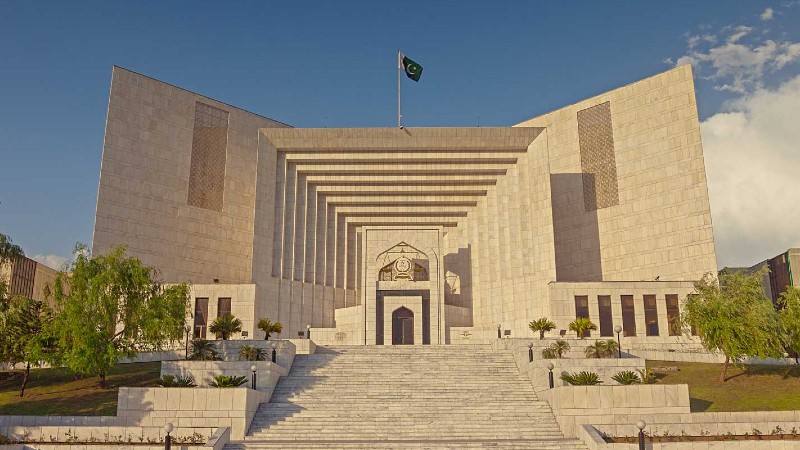The 3-2 ruling says votes against party line in the election of prime minister or chief minister, a vote of confidence or no confidence, a Constitutional amendment bill, and a money bill should be nullified
By Staff Reporter
ISLAMABAD: The Supreme Court of Pakistan Tuesday ruled the votes of any parliamentarians dissenting with their party position in four crucial matters would not be counted.
Ceased with the hearing of a presidential reference seeking interpretation of Article 63(A), the five-member larger bench of the apex court delivered a 3-2 split decision in the matter.
The majority ruling was authored by the Chief Justice of Pakistan, Umar Ata Bandial, and supported by Justice Ijaz-ul-Ahsan and Justice Muneeb Akhtar. The dissenting judges were Justice Mazhar Alam Miankhel and Justice Jamal Khan Mandokhel.
The dissenting judges say Article 63A of the Constitution is a complete code in itself, which provides a comprehensive procedure regarding defection of a parliamentarian and its consequences. They maintain if the Election Commission of Pakistan confirms the declaration sent by a Party Head against a member, the member in question ceases to be a Member of the House and their seat becomes vacant.
“Any further interpretation of Article 63A of the Constitution, in our view, would amount to re-writing or reading into the Constitution and will also affect the other provisions of the Constitution, which has not even been asked by the President through this Reference”, sys the dissenting note.
“Therefore, it is not our mandate. We see no force in the questions asked through this Presidential Reference, which are answered in the negative. However, if the Parliament deems fit or appropriate may impose further bar or restrictions upon the defectors.”
President Arif Alvi had sent the reference to the SCP on the advice of the now ousted Prime Minister Imran Khan, the chairman of his own Pakistan Tehreek-e-Insaf (PTI) party, when he was facing a vote of no confidence in National Assembly.
The reference sought clarity on Article 63(A) as several PTI lawmakers were likely to vote on the no-trust motion against then Prime Minister Imran Khan. It requested SCP guidance as to which of the several possible interpretations of Article 63(A) should be adopted in the matter.
The four questions asked in the Presidential reference
- Whether defected members cannot be prevented from vote under Article 63(A) for violating party policy?
- Will the vote of defected members can be counted or not?
- Whether those who go against the party policy will be disqualified for lifetime or not?
- What is the period of disqualification under Article 63(A)?
The bench has now ruled by a majority that any dissenting lawmakers should not be allowed to vote against party lines in four crucial situations, also outlined in Article 63-A, which are the election of prime minister or chief minister; a vote of confidence or no confidence; a Constitutional amendment bill; and a money bill.
Justice Bandial said the court has conducted many hearings in the case now and urged the Attorney General of Pakistan (AGP) not to go into technicalities as matters had advanced beyond the issue of maintainability.
“This is not a technical matter but a constitutional one”, AGP Ushtar Ausaf said, voicing his agreement with the court’s observation.
In terms of the first two questions referred to the court, the majority opinion in the short order issued by the court said: “In its essence Article 63A functions to protect, and ensure the continued coherence of, political parties in the legislative arena where they are the primary actors in our system of parliamentary democracy, which is one of the salient features of the Constitution.
“Political parties are an integral aspect of the bedrock on which our democracy rests. Their destabilization tends to shake the bedrock, which can potentially put democracy itself in peril.
“Defections are one of the most pernicious ways in which political parties can be destabilized. Indeed they can delegitimize parliamentary democracy itself, which is an even more deleterious effect.
“Defections rightly stand condemned as a cancer afflicting the body politic. They cannot be countenanced.”
To the second question, the ruling said the vote of any member of a parliamentary party in a House cast contrary to party line cannot be counted and must be disregarded, irrespective of whether the party head subsequently takes action resulting in a declaration of defection.
Regarding the third question, the majority opinion said a declaration of defection in terms of Article 63A of the Constitution can be a disqualification under Article 63, but would require legislation by Parliament under para (p) of clause (1) of Article 63.
“While it is for Parliament to enact such legislation it must be said that it is high time that such a law is placed on the statute book”, the judges aid. “If such legislation is enacted it should not amount to a mere slap on the wrist but must be a robust and proportionate response to the evil that it is designed to thwart and eradicate.”
The judges said the fourth question referred to the Court was stated in “vague, and too broad and general” terms, and was therefore returned unanswered.
Earlier, the AGP told the apex court lawmakers were elected to parliament for five years by the masses and the prime minister became the chief executive by the votes of these lawmakers.
The lawmakers are answerable to the people, he said, adding that if a prime minister fails to fulfill promises he made to the public then what should happen, the AGP asked.
In such a case, the lawmakers could tender their resignations, a judge said. However, the AGP retorted that the lawmakers could remove the premier for not fulfilling their promises to the people.
AGP’s written response
The AGP in his written submission stated that the considered scheme of the Constitution, having evolved from the 1962 and 1985 Acts, found expression in the 14th Amendment of 1997, before finally being crystallized in Article 63-A vide 18th Amendment, which restored parliamentary rule by majority vote and not by dictation.
“In my considered opinion, Article 63-A is couched in clear and unambiguous terms; it provides a complete code to ensure a failsafe mechanism; it is closer to an Islamic dispensation; it repeals earlier notions relating to the discarding of votes; and it addresses the consensus raised in the declaration of law in the judgments rendered before its enactment.
“No additional penalties are called for, nor is there any element of khiyanat (dishonesty) when members of a single parliamentary party choose to disagree with a direction made in writing (one that has been conveyed to him or her).
“Each case would have to be examined on its own merits, according to the peculiar facts and circumstances of each case, as and when it reaches this court in its appellate jurisdiction.
The AGP said the purpose of Article 63-A, as informed by its previous iterations, the debates within the legislature, and the content of the provision itself, was unmistakable. It was “that a member of parliament may exercise his constitutional right to express himself, to associate with a higher ideal, and to represent the aspirations of his constituents, by voting against the directions of the party head”.
It was also the purpose of Article 63-A “that the party head retains a considered discretion in terms of adjudging whether the member voted for mala fide reasons or, in the alternative, answered the call of his conscience”.
Finally, it was the purpose of Article 63-A “that the member may be de-seated, and then is free to exercise his right to re-contest elections and, as held by this apex court in Khawaja Tariq Rahim’s case, make politics clean, and give rise to the emergence of principled leadership.”
The complete text of the short order can be read below.
Copyright © 2021 Independent Pakistan | All rights reserved




